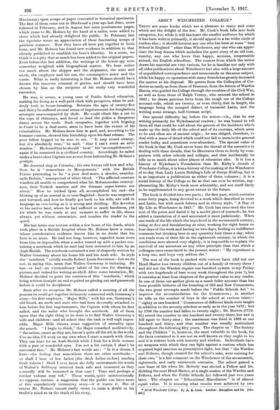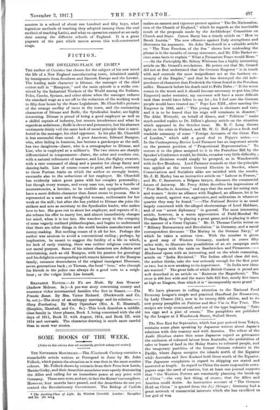ABOUT WINCHESTER COLLEGE.°
THERE are some books which are a pleasure to many and some which are the delight of the few, Mr. Cook's book falls into both categories, for, while it will fascinate the smaller audience for which it has been written primarily, it should appeal to a far wider circle of readers also ; it should interest any one who has been at some " best School in England " other than Winchester, any one who can appre- ciate the long drama which underlies the quiet story of en old corn. munity, any one who loves that happy, anxious, irrepressible animal, the English schoolboy, The sources from which the writer draws his material are very various, for he is familiar not only with all olderpublications about Winchester but also with a large amount of unpublished correspondence and memoranda on the same subject, while his happy co-operation with many friends has greatly increased the matter at his disposal. He quotes from the Colloquies of Cor- derius as easily as from those of Erasmus, from the letters of Warden Harris, who guided the College through the troubles of the Civil War, as well as from those of Ralph Verney, who entered the school in
1682 ; he draws precious facts from the rough ore of the College account-rolls, which are twenty, or even thirty, feet in length, the language being the mongrel dialect of buraarial Latin, and the writing some strange, half-German script.
One special difficulty lay before the writer—viz., that he was writing primarily for Wykehamical readers ; he was bound to tell thorn all that could be told about the genesis of the incidents which make up the daily life of the school and of its customs, which seem to be and often are of ancient origin ; he was obliged, therefore, to deal with a mass of detail which could not fail to seem to the general reader bulky and sometimes over-abundant. The special value of the book is that Mr. Cook never loses the thread of the narrative in dealing with these details, that he illustrates them so freely by com- parison with other schools and colleges, and that incidentally he tells us so much about other places of education also. It is less a history of Wykoham'a Foundation than Mr. Kirby's Annals ni Winchester College, it is leas a history of the making of the Winchester of to-day than Lady Laura Ridding's Life of George Ridding, but it is as important a publication as either of these volumes ; it is a social history of the College so far as that can over be written, sup- plementing Mr. Kirby's book most admirably, and not itself likely to be supplemented to any groat extent in the future.
The book is divided into two parts ; the first part, which contains some forty pages, being devoted to a work which described in verso and Latin, but with much fulness and in cheery style, " A Day of My Life at Winchester in 1647." Mr. Cook has recovered the true text of the poem and dated it by a model piece of research ; he has added a translation of it and annotated it most judiciously. When one reads of the life which the boys lived in the seventeenth century, rising at five and breakfasting at nine, working for eight hours on four days of the week and fasting on two days, feeding on indifferent commons but drinking boor in any quantity four times a day, when one reads oven of their life in the eighteenth century, in which the conditions worn altered very slightly, it is impossible to explain the survival of our ancestors on any other principle than that which a colleague once enunciated to the present writer : "My experience is a long one, and boys very seldom die."
The rest of the book is packed with curious facts (did not one Head-Master lose twenty children out of a family of twenty-three and did not the Warden require one hundred oysters every Friday with two hogsheads of boar every week throughout the year I), but it contains at least four chapters of the greatest value to any reader. In one of them our author gives us a much fuller account than has been possible hitherto of the founding of Old and New Commoners, the two great attempts made before the "Public Schools Act" to improve the accommodation for the Commoners ; in another ho tells us the number of boys in the school at various times- " eighty or one hundred " Commoners of different kinds were taught in addition to the seventy scholars as early as in the year 1412 ; but by 1700 the number had fallen to twenty-eight ; Dr. Burton (1724- 65) raised the number to one hundred and twenty-three, but saw it fall again to thirty-nine ; the maximum was fixed in 1809 at one hundred and thirty, and that number was usually maintained throughout the following fifty years. The chapter on " The Society and the Children " is, however, the most valuable in the book, for the facts contained in it are not as well known as they ought to be, and it is written both with honesty and wisdom. Individuals have no weapons with which they can fight against a custom whirls has acquired legal sanction as prescriptive right, but that " the Warden and Fellows, though created for the school's sake, were existing for their own " is a fair comment on the Winchester of the seventeenth, eighteenth, and early nineteenth centuries. The school gained a new lease of life when Dr. Moberly was elected a Fellow and Dr. Ridding the next Head-Master, at a single session of the Warden and Fellows, and when the Public Schools Act followed just two years later. The chapter on " Educational Miscellanies " is of almost equal value. It is amazing what resulta were achieved by two
• Same Blakely Coilege, By A, K. Cook. London: Managfin and Co. dies: 244
masters in a school of about one hundred and fifty boys, what ingenious methods of teaching they adopted (among them the oral method of teaching Latin), and what co-operation existed at an early date among the different schools of England. It is a great pageant of the past which moves across this well-constructed stage.















































 Previous page
Previous page